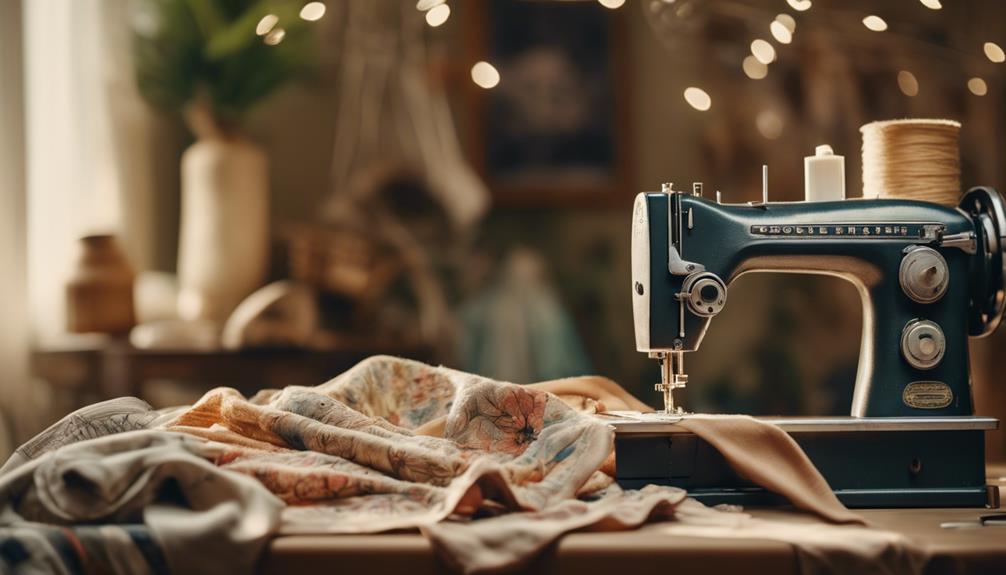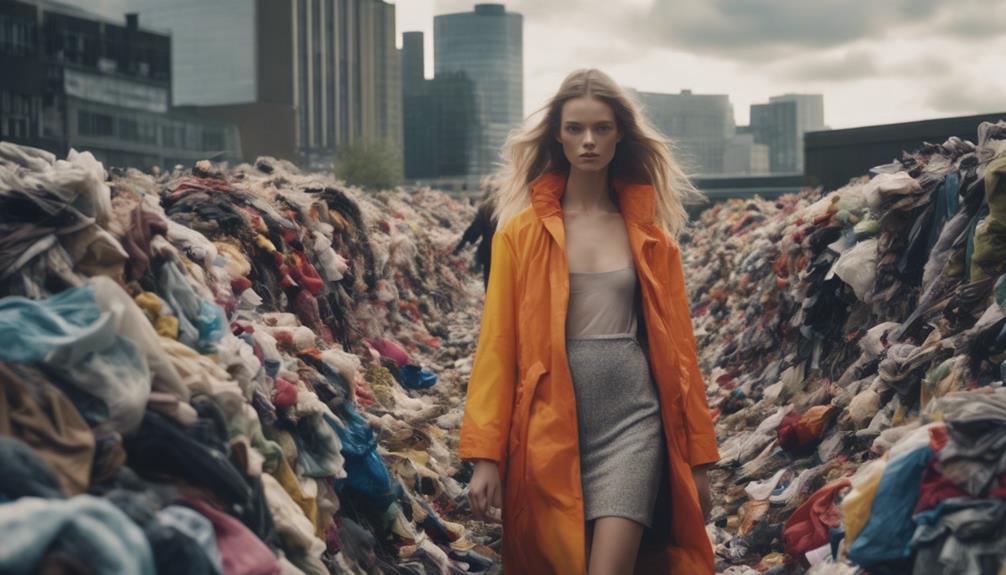You may think sustainable fashion is only popular among young people, but the truth is different! Millennials, especially those who are well-off, prioritize sustainability and are willing to spend more on eco-friendly products. Even Baby Boomers are joining in, with half of them preferring eco-conscious brands. Generation Z is also playing a role by cutting back on fast fashion consumption. Platforms like TikTok are influencing these changes, making sustainable options more appealing to a wide range of people. Interested in learning more about how these trends are impacting the fashion industry? There’s a lot to explore!
Key Takeaways
- Millennials lead the charge with 71% prioritizing sustainability in their purchasing decisions, influencing market trends significantly.
- Generation Z shows strong interest, with 65% desiring sustainable shopping and actively reducing fast fashion consumption.
- Over 50% of college students aim to minimize fast fashion purchases, reflecting a growing awareness among younger demographics.
- Baby Boomers are also engaged, with half favoring eco-friendly brands and 30% increasing second-hand purchases.
Demographic Shift in Consumers
As younger generations, particularly Millennials and Gen Z, increasingly prioritize sustainability in their shopping habits, the fashion industry is witnessing a significant demographic shift towards environmentally conscious consumer behavior.
You're part of a movement that reflects a growing awareness of fashion's environmental impact. A remarkable 71% of Millennials are making sustainability a key factor in their purchasing decisions, while over half of college students are actively trying to cut down on fast fashion.
Gen Z consumers are leading the charge even further, with 65% of them expressing a desire to shop more sustainably. This trend signifies a fundamental change in how you and your peers view fashion. Women, in particular, are more inclined to prioritize sustainable fashion options, showcasing a demographic trend that's reshaping the market.
The industry is responding to this shift, with 12.5% of the global fashion market committing to sustainability changes by 2020. As you embrace sustainable fashion, you're not just changing your wardrobe; you're influencing the entire fashion landscape, driving brands to adopt more ethical practices that align with your values.
Motivations Behind Sustainable Choices
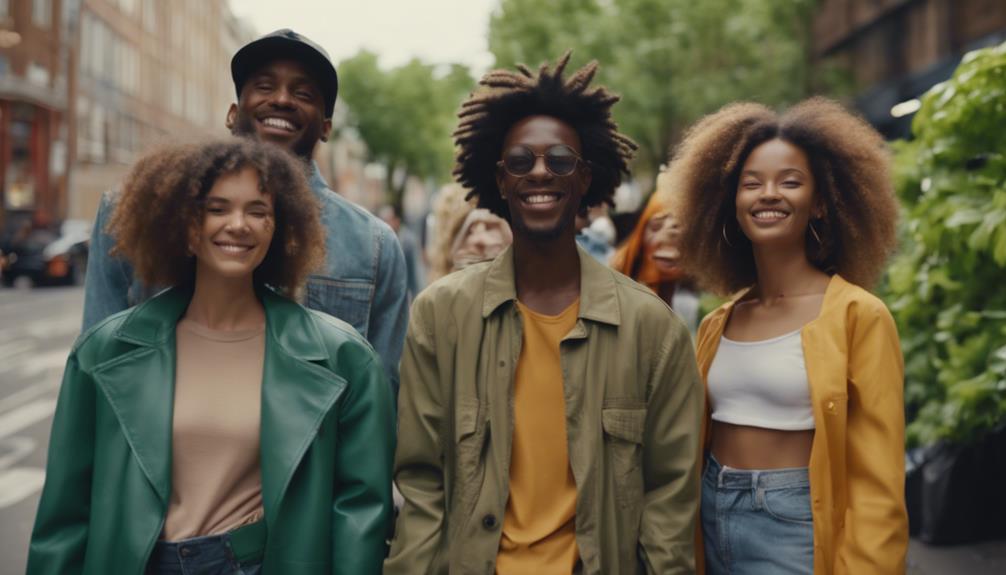
Understanding the motivations behind your sustainable choices reveals a commitment to not only personal values but also a broader impact on the planet and society. Many consumers, especially millennials, prioritize sustainability in their shopping habits, with a staggering 71% focusing on eco-conscious products. This shift highlights a growing awareness of how your purchasing decisions affect the environment.
When you choose sustainable brands, you're not just buying clothes; you're supporting ethical fashion that promotes fair labor practices and reduces environmental impact. For 65% of Gen Z consumers, these ethical considerations play a significant role in their buying decisions. You might also find it reassuring that 51% of college students actively aim to reduce their fast fashion purchases, indicating a collective desire to invest in environmental sustainability.
Currently, 15% of global consumers prioritize sustainability, but this number is expected to soar to over 50% in the coming years. By aligning your values with your purchases, you contribute to a movement that favors sustainable choices. Your commitment helps shape a future where ethical fashion isn't just a trend but a norm, ultimately benefiting society and the planet as a whole.
The Role of Social Media
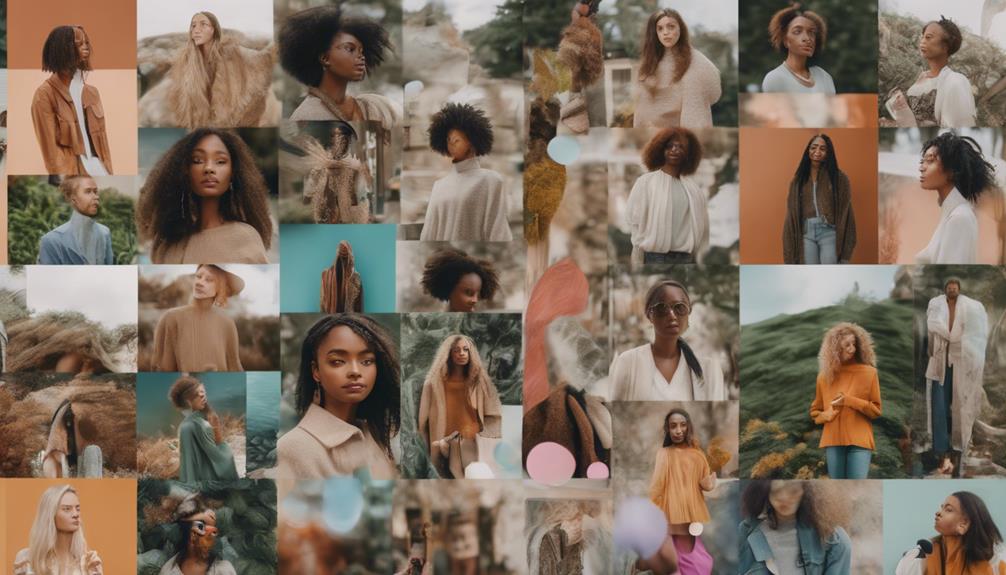
Social media plays an essential role in shaping your sustainable fashion choices. Influencers and viral challenges not only inspire you to make eco-friendly decisions but also foster a sense of community among like-minded shoppers.
Influencer Impact on Choices
Influencers on platforms like Instagram and TikTok are reshaping how you think about sustainable fashion, making eco-friendly choices more appealing and accessible. With 71% of millennials prioritizing sustainability while shopping, it's clear that influencer endorsements play a significant role in driving consumer behavior. When influencers spotlight sustainable brands, they help create a more informed audience that values ethical labor practices and environmental responsibility.
Here's a quick look at how influencers impact your choices:
| Influencer Impact | Effect on Consumer Behavior |
|---|---|
| Increased Awareness | More people learn about sustainable brands. |
| Trust in Recommendations | Followers are more likely to purchase endorsed products. |
| Community Engagement | Creates a network of eco-conscious consumers. |
| Shift in Preferences | Many actively seek sustainable options over fast fashion. |
As the rise of 'green influencers' continues, you'll find yourself more inclined to explore sustainable fashion options. With 51% of college students expressing a desire to shop sustainably due to online influence, it's evident that social media is a powerful tool in shaping your purchasing decisions.
Viral Sustainability Challenges
How can viral sustainability challenges on platforms like TikTok and Instagram reshape your shopping habits and encourage a more eco-conscious lifestyle? These challenges, driven by viral trends, push you to rethink your choices and embrace sustainable fashion. For instance, the #NoNewClothes challenge encourages participants to avoid buying new clothing for a certain period, sparking conversations about fashion waste and sustainability.
Social media plays a vital role in amplifying these movements. With 71% of millennials prioritizing sustainability, it's clear that social media campaigns greatly influence your shopping decisions. Platforms highlight the adverse effects of fast fashion, motivating you to seek eco-friendly alternatives.
Moreover, over 65% of Gen Z show interest in shopping sustainably, largely due to the visibility of sustainable brands on social media and influencer endorsements. Hashtags like #SustainableFashion and #EcoFriendlyFashion have gained millions of views, showcasing a collective awareness of the environmental and ethical implications tied to your clothing choices.
Engaging with these viral sustainability challenges can empower you to make more informed decisions, ultimately shaping a greener future.
Community Engagement Online
Online communities play an essential role in connecting you with sustainable fashion trends and resources, making it easier to embrace eco-friendly choices. Social media platforms like TikTok and Instagram are at the forefront of this movement, influencing your awareness and engagement with sustainable fashion. With 71% of millennials prioritizing sustainability in their shopping, these platforms help you discover brands that align with your values.
Engagement is driven by online communities and influencers who actively promote sustainable alternatives, sparking interest and demand for eco-friendly options. Hashtags like #SustainableFashion and #SlowFashion have gained millions of posts, creating a vibrant community around ethical practices. This online presence fosters transparency, allowing brands to showcase their sustainability initiatives and interact authentically with you.
Moreover, social media empowers you by spreading information about the negative impacts of fast fashion, helping you make informed purchasing decisions. As you engage with these communities, you contribute to a collective shift towards sustainable fashion, reinforcing the importance of eco-friendly choices in your wardrobe.
Sustainable Fashion Across Age Groups

When you look at sustainable fashion, you'll notice that different age groups have unique preferences.
Millennials are driving the movement with their strong focus on sustainability, while Gen Z is shaping trends through their social media influence.
Even baby boomers are starting to shift their buying habits, showing a growing interest in eco-friendly options.
Millennial Sustainability Preferences
Millennials are leading the charge in sustainable fashion, with a remarkable 71% prioritizing eco-friendly choices in their shopping habits. As a millennial consumer, you likely recognize the importance of sustainable materials and how they impact the environment. With growing awareness about the negative effects of the fast fashion industry, many of you are making conscious decisions to reduce your purchases from brands that prioritize speed over sustainability.
Approximately 51% of college students are actively trying to cut back on fast fashion, highlighting a shift in mindset. You're not just looking for trendy pieces; you want clothing that aligns with your values. About 65% of your peers express a desire to shop more sustainably, and this collective demand is pushing brands to adapt.
Social media platforms like TikTok and Instagram are instrumental in this movement, as they raise awareness about the ethical implications of fast fashion and promote sustainable alternatives. By engaging with these platforms, you're part of a community that values transparency and sustainability in fashion. Your choices matter, and they're shaping the future of the industry.
Gen Z Influences Trends
As Gen Z takes the lead in sustainable fashion, their strong values and social media influence are reshaping trends across all age groups. With 65% of Gen Z wanting to shop more sustainably and 51% actively reducing fast fashion purchases, it's clear they're driving the movement.
By using platforms like TikTok and Instagram, they raise awareness about the harmful effects of fast fashion and showcase sustainable alternatives, making eco-conscious choices more accessible and trendy.
Millennials are also on board, with 71% prioritizing eco-friendly options when shopping. This growing commitment to sustainability is evident in the fashion industry, where around 12.5% of the global market had committed to sustainable practices by 2020, largely due to the influence of younger consumers.
Brands recognize this shift and are adapting their practices and marketing strategies to cater to the environmentally-conscious preferences of both Gen Z and Millennials.
As you look for fashion that aligns with these values, remember that your choices can support a broader movement towards sustainability, impacting not just your wardrobe but the future of the fashion industry as a whole.
Baby Boomers' Shift
Increasingly, Baby Boomers are prioritizing sustainable fashion, with half of them now favoring eco-friendly brands in their purchasing decisions. This demographic, once seen as less environmentally conscious, is shifting their mindset as they become more aware of the environmental impact of their choices. In fact, 71% of Baby Boomers consider a brand's sustainability practices before making a purchase.
Many are turning to thrift stores, with a notable 30% increase in second-hand purchases over the past few years. Thrift shopping not only promotes sustainability but also allows for unique finds that align with their values.
The rise of social media has played an essential role in this shift, providing Baby Boomers with easy access to information about sustainable fashion, leading to a 40% increase in their online engagement with this content.
Sustainable brands are recognizing this change and are tailoring their marketing strategies to attract Baby Boomers, who value quality and longevity over fleeting trends. By prioritizing sustainable options, you're joining a growing movement that emphasizes ethical purchasing and a commitment to a better future for the planet.
Affluent Buyers and Luxury Brands

Driven by a growing awareness of environmental issues, affluent buyers are reshaping the luxury fashion landscape by prioritizing sustainable practices in their purchasing decisions.
You'll find that 71% of millennials within this demographic emphasize sustainability, prompting luxury brands to adapt their strategies and attract these conscientious consumers. Brands like Stella McCartney and Gucci lead the charge, utilizing innovative materials and committing to ethical labor practices.
Research shows that 60% of affluent shoppers are willing to pay a premium for sustainable products, valuing quality and ethical production over fast fashion alternatives. This shift is significant; a 2020 survey revealed that 12.5% of the global fashion market committed to sustainable practices, demonstrating luxury brands' increased integration of eco-friendly methods into their core business strategies.
As the sustainable fashion market for luxury goods continues to grow, affluent buyers increasingly seek to align their purchases with their values. This movement not only reflects a changing mindset but also contributes to creating a more eco-conscious luxury industry, ensuring that high-income consumers can enjoy responsible luxury without compromising on style or quality.
Ethical Considerations in Purchases

Ethical considerations are becoming central to your purchasing decisions, with a notable 71% of millennials prioritizing sustainability in their shopping habits. This shift reflects a growing awareness of the impact of fast fashion on both the environment and labor practices. You're not alone—65% of Gen Z consumers also weigh ethical concerns heavily when choosing what to buy.
If you're a college student, you might relate to the 51% who want to cut back on fast fashion, demonstrating a commitment to ethical consumption. Social media plays a vital role in this change, as platforms have become hotspots for sharing information about sustainable brands and the negative consequences of fast fashion.
As you navigate your purchases, consider that around 15% of global consumers are currently prioritizing sustainability, a number expected to rise considerably in the coming years. This trend indicates that ethical considerations in purchases aren't just a passing fad; they're becoming essential for a large segment of the market.
Local Vs. Global Sustainable Brands
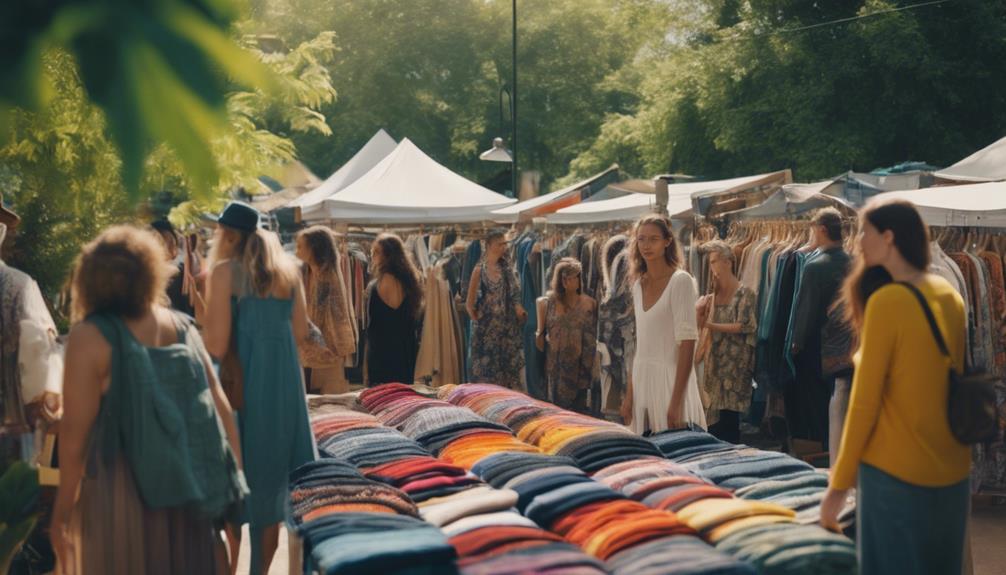
As you explore sustainable fashion options, you'll notice a clear distinction between local and global brands, each offering unique approaches to ethical consumption.
Local sustainable brands often emphasize community engagement and transparency, creating products from locally sourced materials. This focus helps reduce carbon footprints, making them appealing to environmentally conscious shoppers like you.
In contrast, global sustainable brands, while they may have a broader marketing reach and more resources for innovation, often face scrutiny regarding their authenticity. Potential greenwashing practices can make you question their true commitment to sustainability.
Despite these challenges, well-known global sustainable brands like Patagonia and Stella McCartney have successfully integrated eco-friendly practices into their business models. This not only raises consumer awareness but also sets industry standards that local brands can aspire to.
With 71% of millennials prioritizing sustainability in shopping habits, both local and global brands are adapting to meet your demand for ethical products.
In your journey toward sustainable fashion, consider supporting local brands for their craftsmanship and unique offerings while recognizing the impact of global brands in raising awareness and promoting sustainable practices across the industry.
Brands Responding to Consumer Demand
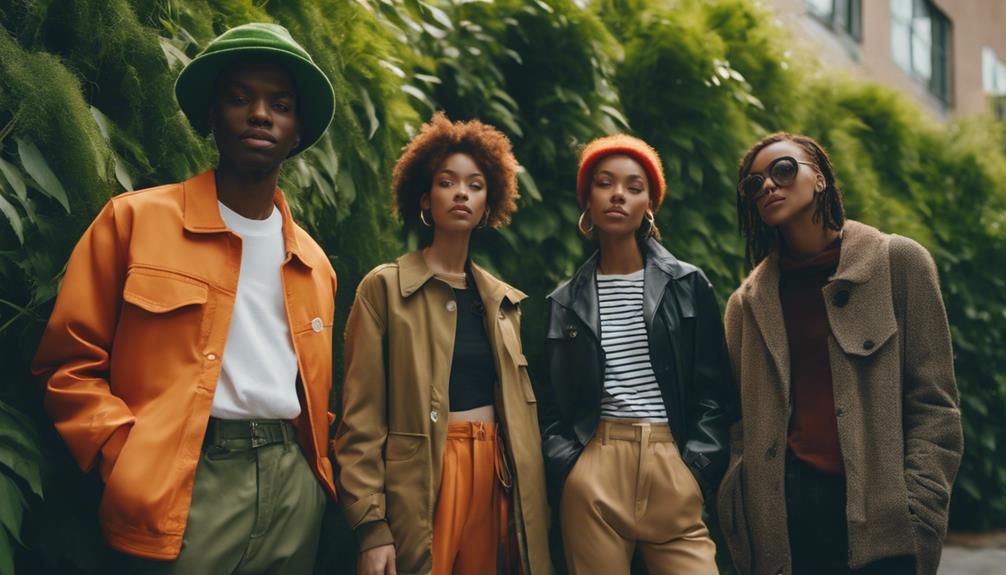
More and more brands are recognizing the importance of sustainability and are adapting their practices to align with your demand for eco-friendly fashion.
Brands like Patagonia and Everlane are prioritizing transparency and using recycled materials to create products that resonate with your values. In 2020, a notable 12.5% of the global fashion market committed to implementing sustainability changes, showcasing a significant shift driven by consumer preferences.
Millennials and Gen Z are leading this movement, with 71% of millennials prioritizing sustainability in their shopping habits. This shift has prompted major retailers such as H&M and Levi's to invest in sustainable strategies, including recycling initiatives and organic materials. You're not just demanding change; you're shaping the future of the industry.
Social media platforms have also played a vital role in amplifying your awareness and demand for sustainable fashion. As you engage with brands and share your values, they feel pressured to innovate and maintain their relevance.
The Future of Sustainable Fashion Buying

The future of sustainable fashion buying hinges on your growing desire for eco-friendly choices, which is reshaping how brands operate and innovate. As a millennial, your commitment to sustainability is driving significant changes in the fashion industry. With 71% of your generation prioritizing sustainable options, brands are adapting to meet your expectations.
Looking ahead, here are some key trends shaping sustainable fashion buying:
- Increased transparency: Brands will provide more information about their sourcing and production processes.
- Technological advancements: Innovations in materials and recycling methods will make sustainable fashion more accessible.
- Social media influence: Platforms like TikTok and Instagram will continue to shape your purchasing decisions, emphasizing eco-friendly options.
This shift not only reflects your values but also hints at a broader movement toward responsible consumption.
As you choose sustainable fashion, you're not just making a purchase; you're participating in a change that prioritizes our planet's health. Your choices today will pave the way for a more sustainable future. Over the years, the history of sustainable fashion has shown that small, conscious choices can have a big impact in the long run. By supporting brands and practices that prioritize environmental and social responsibility, you’re contributing to a more ethical and eco-friendly fashion industry. The history of sustainable fashion is one of progress and innovation, and your choices today will continue to shape its future.
Frequently Asked Questions
Who Is Buying Sustainable Fashion?
You're likely part of a growing trend where younger generations prioritize sustainable fashion. With social media influencing your choices, you're more inclined to seek eco-friendly options while reducing fast fashion purchases for a healthier planet.
Why Do People Prefer Sustainable Fashion?
You prefer sustainable fashion because it aligns with your values. You care about ethical labor practices and the environment, wanting to make responsible choices that reflect your commitment to a healthier planet and future.
Do People Really Care About Sustainable Fashion?
You might think sustainability's just a trend, but it's a rising tide. Many consumers genuinely care about eco-friendly practices, though some still struggle to align their values with spending habits. Awareness is growing, yet action lags behind.
Who Is Responsible for Sustainable Fashion?
You're responsible for sustainable fashion by demanding transparency and ethical practices from brands. Your choices influence the market, encouraging companies to adopt sustainable methods. Together, you can create a more responsible and eco-friendly fashion industry.
Conclusion
As you step into a vibrant world where fashion meets purpose, you realize sustainable choices aren't just for the eco-warriors anymore.
Picture a diverse crowd, from trendsetting teens to discerning professionals, all united by a passion for conscious consumption.
The future of fashion is a colorful tapestry woven with ethical threads, where every purchase tells a story.
Embrace this movement, and let your wardrobe reflect not just style, but a commitment to a better world.



